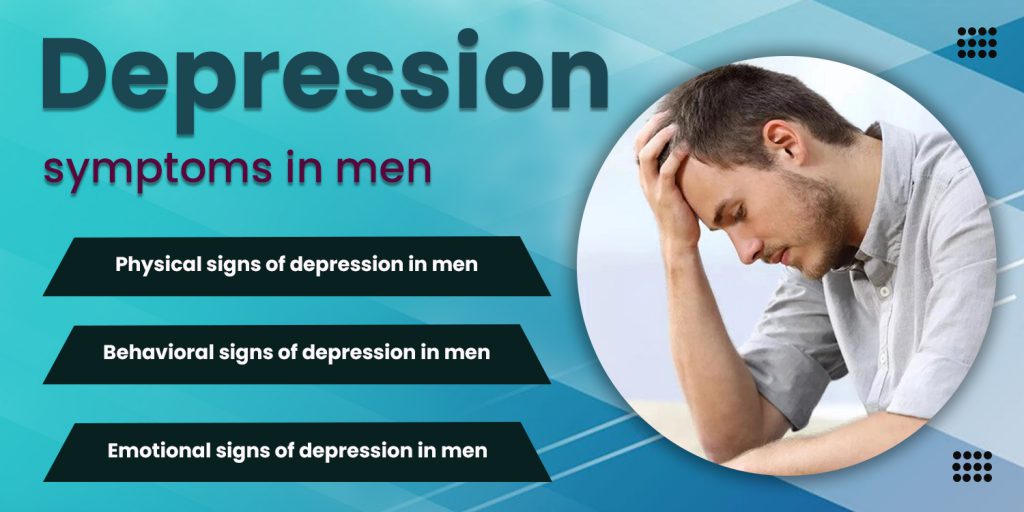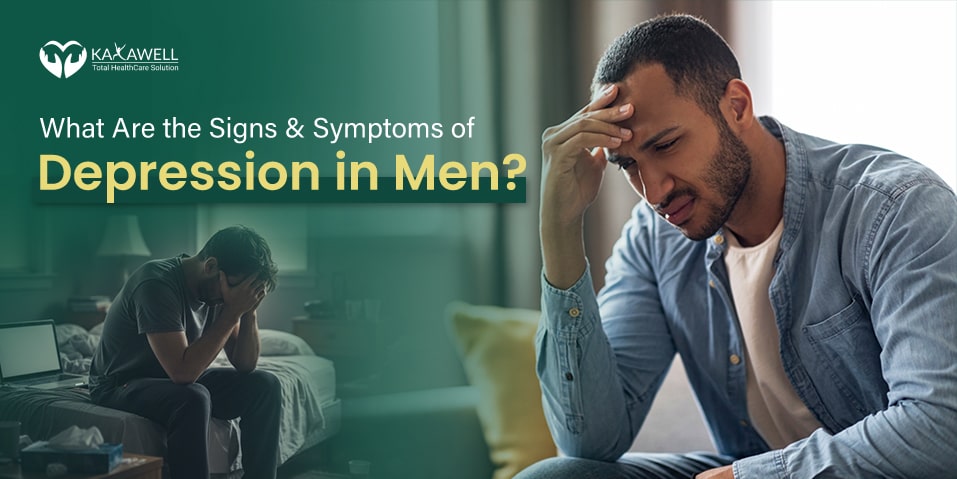Depression is a disease that has no bounds. It can affect anyone, regardless of their age, religion, or gender. Even in the United States, over two-thirds of all cases of depression in men go undiagnosed.
However, ignoring signals of depression is not wise and ill-advised. In this blog, we bring you everything you need to know about the signs and Symptoms of Depression in Men. We hope this blog will help millions of men around the world to fight and win over depression altogether.
Depression in Men
Depression affects nearly 10-17% of males. However, depression in men often overlaps with other problems, making diagnosis difficult.
Everyone gets upset or disheartened from time to time. Normally, negative emotions or a bad mood go away on their own. Depression, on the other hand, is a serious mood disorder that lingers around for a long time and can show up in a variety of ways.
Depression simply is a state of mind that no longer registers pleasure and fun in day-to-day tasks, be it our work or our relationships. But due to lack of awareness and hesitance to express their feelings, male depression remains undiagnosed and untreated.
Undiagnosed Male Depression
Men are far less likely to talk about their mental health issues than women. Untreated male depression can be severely damaging for not just the person but the whole family. There is a consistent feeling of frustration, concern, and fear among family members.
Suicide and Depression
â— 70% of men and women who commit suicide have a depressive disorder
â— Male depression has the highest suicide rate (7%)
â— Those diagnosed with serious depression are 20 times more likely to attempt suicide at some point in their life.
Source: American Association of Suicidology
Depression Symptoms in Men
Common symptoms of depression in men include:
â— Consistent negative emotions like sadness, anger, etc.
â— Feeling worried and easily irritated
â— Loss of enthusiasm for work
â— Fatigued almost every day and don’t have enough stamina to do everyday activities.
â— Marked change in eating and sleeping pattern.
â— Alcohol or drug addiction

Physical Signs of Depression in Men
Our body might show signs of despair as well. Depressed men may exhibit the following signs and symptoms:
â— Chest tightness and headaches
â— Digestion issues
â— Exhaustion
â— Too much or too little sleep
â— Joint, limb, or back pain
â— feeling restless or agitated
â— eating too much or too little
â— Unexplained weight loss or weight gain
Behavioral Signs of Depression in Men
Men suffering from depression may observe the following changes in their behavior:
â— Increased alcohol consumption or drug use.
â— Staying away from family, friends, and social gatherings.
â— Working too much
â— Having trouble keeping up with work or family obligations
â— Becoming more dominant or abusive in a personal relationship
â— Low self-esteem and repeated feelings of suicide
â— Compulsive gambling
Emotional Signs of Depression in Men
â— A feeling of sadness and emptiness
â— Angry or tearful outbursts even over petty issues
â— Frustration and a sense of hopelessness
â— Loss of interest or pleasure in normal activities like work, sports, and even sex
â— Sleeplessness, insomnia, or hypersomnia
Suicidal thoughts are common in men suffering from depression. It may have something to do with how men are expected to express emotion in society. Men are believed to be stronger emotionally and expected to hide negative emotions like sadness. Untreated depression can quickly reach a crisis point where one may feel hopeless and suicidal.
Helping a Loved one Who is Depressed
If you are wondering how to help someone with depression, remember, the most important thing is not to be judgemental. Be kind and understanding. Let the person know that you are always available and ready to listen.
You can start by telling them about the changes you’ve noticed recently that concern you. Don’t be over-critical. Express your concerns neutrally.
You may help them obtain treatment by suggesting that you can do these things for them, reminding them when their appointment is coming up, and accompanying them to the appointment.
If they’re hesitant to see a mental health expert like a psychologist or psychiatrist, check if they’ll go to their primary care doctor, especially if they already know and trust this person. Although it’s preferable to consult a mental health specialist, the most important thing is to get linked to some type of assistance.
Helping Yourself During the Depression
The fight against depression is not going to be easy. However, there is no reason why one can’t win it. With optimism and self-care, one can again regain control over the mind. If you are looking for some tips and ways how to not be depressed, here are a few things that you can follow:
â— Spend quality time with your friends and family. Remember sharing is healing. Don’t hesitate to share your feelings and emotions. Talk about your concerns with a supportive buddy. It will make you feel better.
â— Maintain a cheerful attitude and a consistent daily routine. Share your experiences and opinions with those who care. Also, talk about the positive aspects of your life. This can assist you in improving your mood.
â— Exercising is an excellent stress buster. Consult your physician to discover the best physical activity for you. For starters, you can take a 15- to 30-minute brisk walk every day. You can also stretch, dance, or practice yoga.
â— Don’t feel overwhelmed by your work. Break down complex jobs into manageable chunks. This way, you’ll be able to concentrate on your tasks and complete them successfully.
â— Consume nutritious foods. What you consume has an impact on your energy and mood. Eat smart by adding a variety of fruits, vegetables, and whole grains. When you’re not hungry, eat something light and healthful. Avoid consuming alcoholic beverages.
Why can Depression go Undiagnosed in Men?
There are two primary reasons why depression goes undiagnosed in men.
- Fear of Judgement or Shame: Our society continues to be quite conservative when it comes to mental health issues, particularly depression in men. Men are never comfortable talking about their mental health issues owing to existing social standards. Let alone doctors, men are reluctant to discuss their issues and problems with their family and close friends.
- Effect on Career: Men feel that opening up about their mental health concerns will prove detrimental to their career growth.
How is Depression Treated?
Men frequently avoid addressing depression signs or symptoms. That’s where the role of family and friends becomes so important. They should stand together for their loved one and encourage him to seek treatment.
A timely consultation will help in accurate diagnosis and proper treatment. Further, the individual must be upfront and honest. He should not hesitate to share any information that might disrupt treatment in the long. Some of the questions that the mental health expert will ask include:
â— When did the symptoms first appear?
â— How long have the symptoms continued?
â— If there are individuals in the family with mental health and depression issues?
â— Are there any medications that the individual is currently taking?
â— Is there any history of struggle with alcohol, drugs, gambling, or other concerning activities?
Medications, psychotherapy, or a combination of the two are commonly used to treat depression in men. Depending on the symptoms and severity, the expert may suggest interpersonal therapy, cognitive-behavioral therapy, or psychodynamic therapy. A collaborative approach may be taken up as well. A team of health care providers and management, including a primary care doctor and specialists, participates in collaborative care.
Conclusion
Depression isn’t a condition that can be easily overcome. It’s a situation in which the brain no longer finds pleasure in previously fun activities.
Feeling dissatisfied, guilty, and hopeless daily can be overwhelming for not just the individual but also immediate family and friends. If you or someone you care about is depressed, you must get the best professional care and depression Treatment Dubai.
Find the best mental health experts for depression in men at Kayawell. Fill out this form and get in touch with a top-rated mental health expert now.

Leave a Reply
You must be logged in to post a comment.